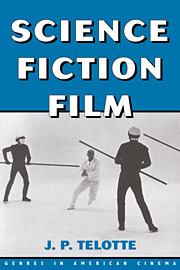Book contents
- Frontmatter
- Contents
- List of Illustrations
- Acknowledgments
- PART I APPROACHES
- PART II HISTORICAL OVERVIEW
- PART III FILM ANALYSES
- 4 The Science Fiction Film as Fantastic Text: THX 1138
- 5 The Science Fiction Film as Marvelous Text: Close Encounters of the Third Kind
- 6 The Science Fiction Film as Uncanny Text: RoboCop
- 7 Crossing Genre Boundaries/Bound by Fantasy: The Fly (1986)
- 8 Conclusion: A Note on Boundaries
- Notes
- Bibliography
- Select Filmography of the American Science Fiction Film
- Index
4 - The Science Fiction Film as Fantastic Text: THX 1138
Published online by Cambridge University Press: 03 December 2009
- Frontmatter
- Contents
- List of Illustrations
- Acknowledgments
- PART I APPROACHES
- PART II HISTORICAL OVERVIEW
- PART III FILM ANALYSES
- 4 The Science Fiction Film as Fantastic Text: THX 1138
- 5 The Science Fiction Film as Marvelous Text: Close Encounters of the Third Kind
- 6 The Science Fiction Film as Uncanny Text: RoboCop
- 7 Crossing Genre Boundaries/Bound by Fantasy: The Fly (1986)
- 8 Conclusion: A Note on Boundaries
- Notes
- Bibliography
- Select Filmography of the American Science Fiction Film
- Index
Summary
In an essay comparing our utopian projections to the broader category of ideology, Paul Ricoeur observes some fundamental similarities. He begins on a somewhat negative note, suggesting that we consider both utopian thinking and ideology “as deviant attitudes toward social reality,” and utopianism especially as a kind of “escapism,” concealing “under its traits of futurism the nostalgia for some paradise lost.” In so doing he addresses a common criticism of most utopian thinking, echoed as well in the work of Fredric Jameson: the notion that our visions of utopias – or dystopias, for that matter – ultimately risk producing a problematic relationship to our world because of their “eclipse of praxis,” that is, the way such fantastic constructions, much like any culture's dominant ideology, too often distract us from what might be done here and now. Nonetheless, he certainly does not dismiss utopian schemes, but suggests that this “nostalgia” is useful when properly approached, the desire for escape or alternative structures a beneficial “pathology” if it can help us to interrogate the prevailing conditions of our culture. While he lays this knotty relationship of escapism and interrogation at the door of a vague function that he terms the “cultural imagination,” the very irresolution of this issue points to another, deeper difficulty with which Ricoeur and other commentators on the utopian imagination typically struggle.
- Type
- Chapter
- Information
- Science Fiction Film , pp. 123 - 141Publisher: Cambridge University PressPrint publication year: 2001

